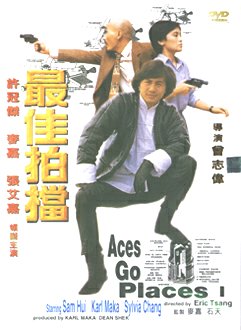Aces Go Places

Director: Eric Tsang
Year: 1982
Rating: 8.0
In 1980 Karl Maka,
Dean Shek and Raymond Wong formed a new production company that they called
Cinema City. Over the next decade the company produced a large number of
films that in general were family oriented comedies that contained loads
of slapstick antics, sight gags, corny romances and stunts. A lot of the
comedy often appears – 20 years later – juvenile in nature, but some of it
still feels inspired and amusing as well.
The largest success that the company had
was the series of the Aces Go Places films that began in 1982 and continued
with four sequels until 1989. The films were extremely popular (and still
are today) and the three main actors – Samuel Hui, Karl Maka and Sylvia Chang
- were to appear in all of them (with the exception of Sylvia in the fifth
film). The list of directors for these five films is fairly impressive –
Eric Tsang directed the first two, Tsui Hark the third, Ringo Lam the fourth
and Lar Kar-leung the fifth.

The films are incredibly high spirited – very silly at times – full of slapstick
and pratfall humor, eye opening stunts, a tune from Sam Hui and excellent
action sequences. Though the action and stunts tend to be quite fun and imaginative,
I find the comedy to be very hit and miss. Some of it is extremely clever
– but much of it is too broad and farcical for my taste – almost Three Stooges
type humor – which can wear a bit thin at times.
What the films do have going for them though
is terrific chemistry between the three main characters. Hong Kong films had
a tradition of the “buddy film” that was made very popular by Michael Hui
in the 70’s. This series of films continues that tradition, but adds the
wonderful Sylvia Chang to the mix. Sam Hui (Michael’s younger brother) is
King Kong – smart, good looking, a great physical athlete (performs the majority
of the action scenes), a weakness for a pretty face and the heart of a fifteen
year adolescent. Karl Maka plays Kodojack a.k.a. Baldie a.k.a. Albert – a
Chinese American cop completely full of his own high opinion of himself –
and very little of it justified. Then to round them out is Sylvia Chang –
as HK policewoman Nancy Ho - who can be as ferocious as a pit bull or soft
and tender as a lullaby. The three of them play off one another to wonderful
advantage – have great timing – and beneath the insults, threats and the
braggadocio they create a warm sense of friendship and loyalty to one another.

In this first episode the three characters are introduced to one another
and are initially all at odds with each other. The film begins in James Bondian
fashion with a pre-credit action sequence that is very good. Sam has a bit
of a larcenous nature and steals a bag of diamonds from some Mafioso types
by shooting a harpoon from a roof top into a building across the road and
then sliding down the rope, crashing into the room, grabbing the diamonds
and escaping on a hidden motorcycle in the building and then later on a hang
glider.

The Mafia head – doing his best Brando stuffed mouth imitation – sends White
Gloves to HK to recover the valuables and to kill Hui. Word of this leaks
out and White Glove’s number one nemesis in the world – Super Sleuth Kodojack
– also comes to HK to track down his prey. He is teamed up with a tough grouchy
cop - Sylvia Chang - and it is loathing on first sight. They do eventually
warm up to each other – and Sylvia soon gets as giddy as a schoolgirl around
her Albert. And Albert is only to happy to remind her, that she is closing
in on thirty – old maid territory – and who but him would still marry her!

Eventually, the two of them force Hui to co-operate with them to catch White
Glove but he has given the diamonds to his accomplice – Dean Shek – who has
hidden them and then disappeared. The only clues they have to the whereabouts
of the loot are tattoos on the bottoms of two of Shek’s girlfriends! Trying
to uncover them leads to crazy shenanigans involving the triads and the HK
ballet (run by Tsui Hark). Much of this is fairly entertaining and the comedy
feels a bit lower key in contrast to the sequels in many ways.







